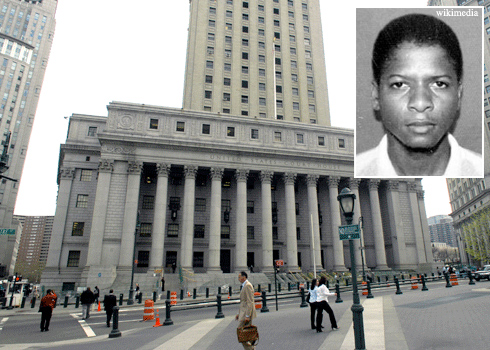Opponents of trying terrorism suspects in a federal court in New York City openly anticipated a disaster last November after Attorney General Eric Holder announced that Sept. 11 so-called mastermind Khalid Sheikh Mohammed and other terrorism suspects would be tried in the Big Apple. The civilian court system just wasn’t capable of handling these type of issues, they said. The terrorists could get off scot-free, they added, on some technicality and be roaming the streets in no time.
But this week, admitted Times Square bomber Faisal Shahzad — whose case was handled entirely in the domestic courts despite calls for him to be tried in a military tribunal — was sentenced to life in prison without the possibility of parole. And, today, another accused terrorist, Ahmed Khalfan Ghailani, faces the start of his trial in New York City with virtually no fanfare.
Human rights groups say such cases demonstrate that the civilian justice system can handle terrorism cases pretty darn well. And with the biggest anti-terroristm voices on the seemingly singularly focused on the proposed Islamic cultural center in Lower Manhattan, Ghailani’s court case — the first trial of a former Guantanamo Bay detainee in a civilian court — is largely flying under the radar.
Ghailani, the government alleges, was an associate of Osama bin Laden who conspired to kill Americans in the 1998 bombings of two U.S. embassies in Africa. He allegedly served as a bodyguard, cook and document forger for bin Laden, and was captured in Pakistan in 2004. After being held in a secret CIA prison for two years, he was transferred to Gitmo in 2006, and then moved to New York City in the summer of 2009. He allegedly acknowledged meeting bin Laden and receiving al Qaeda military training, but denied being a member of al Qaeda.
So while his case is less spectacular than any potential trial of the Sept. 11 co-conspirators, his case isn’t small potatoes. And while the effort to close Guantanamo has pretty much come to a screeching halt, the case could be a test for trying former detainees in civilian court.
After the sentencing of the Times Square bomber yesterday, the White House suggested that the successful prosecution in that case refuted many of the claims of those insisting on military tribunals in others.
“We are pleased that this terrorist has been sentenced to spend the rest of his life in prison, after providing substantial intelligence to our interrogators, and a speedy civilian trial,” said White House spokesman Nick Shapiro. “We tried the case in a civilian court, we were able to use everything that he said and everything that we uncovered for intelligence collection purposes. His trial served no propaganda purpose for al Qaeda, and only underscored the strength of our justice system. The case shows once again how our values and the rule of law can keep us safe against those determined to do us harm on behalf of terrorist organizations overseas.”
Shapiro didn’t return a request for comment on the Ghailani case.
The Justice Department is “committed to using every instrument of national power to fight terrorism,” DOJ spokesman Dean Boyd told TPMMuckraker. “In each instance, we will use the tool that is most effective for the particular matter at hand, whether it be a trial in federal court, a military commission prosecution, an intelligence solution, or other option,” he said. “We will make those decisions based on pragmatism.”
But despite the outcome of the Times Square bomber case, Liz Cheney again criticized the Obama administration for the use of civilian courts. “President Obama and his administration still seem to believe they can keep this nation safe by convicting terrorists in civilian courts,” Cheney said. “We tried that policy throughout the 1990s and gained convictions of key terrorists. None of those convictions prevented the terrorists from attacking us again and again. Americans expect their government to disrupt plots and defeat terrorists before they can attack us.”
“The Times Square bomber’s attack failed not because it was thwarted, but because his bomb failed to detonate,” Cheney said. “Being lucky is not a responsible counterterrorism strategy, and convictions in civilian courts will not keep this country safe.”
Cheney’s spokesman didn’t return a request for comment specifically on the Ghailani case.
Meanwhile, when jury selection for the Ghailani trail got underway last week, most New Yorkers were going about their daily business. The group Human Rights First sent a film crew out to get the reactions of residents, and those interviewed by the group observed that “everything seems pretty normal,” “I haven’t noticed anything,” and “I’m sure everybody knows what they are doing.”
“Despite the best efforts of Liz Cheney, Deborah Burlingame, Rudy Guiliani, and Karl Rove to spread panic, many naïve New Yorkers seemed completely uninformed about the chaos that was supposed to reign,” the group said in a press release.
Video embedded below.
Late Update: Ghailani’s trial was delayed on Wednesday because a judge ruled the prosecution’s star witness couldn’t testify. The judge ruled that the witness, Hussein Abebe “was identified and located as a close and direct result of statements made by Ghailani while he was held by the CIA.” Ghailani’s lawyers had said investigators only learned about the witness after the terrorism suspect had undergone harsh interrogation in the CIA’s custody at a secret overseas camp between 2004 and 2006. Federal prosecutors asked for a delay to decide whether the government would appeal.









